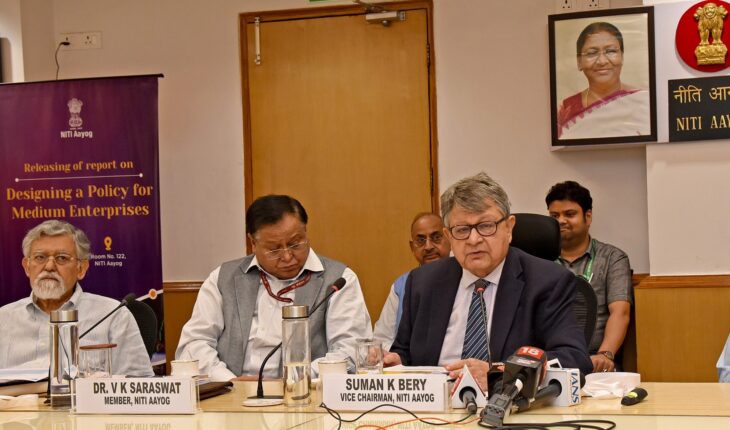New Delhi: NITI Aayog released a comprehensive report titled ‘Designing a Policy for Medium Enterprises,’ outlining strategic recommendations to enhance the contribution of medium enterprises to India’s economic development.
Releasing the report, Vice Chairman of NITI Aayog Suman Bery believed that the report exclusively focusing Medium Enterprises would herald a new era for growth oriented enterprises.
The study carried out by NITI Aayog with Administrative Staff College of India (ASCI) addresses the specific challenges faced by this crucial segment of the Micro, Small, and Medium Enterprises (MSME) sector.
Presenting the report Programme Director, NITI Aayog Ishtiyaque Ahmad highlighted that medium enterprises generate 40 per cent of MSME exports, contribute 81 per cent of R&D investment, and employ the highest number of individuals per unit—89 on average—compared to just 6 and 19 in micro and small enterprises, respectively.
However, they are constrained by limited access to finance, outdated technology, poor awareness of government schemes, and regulatory burdens.
Current MSME schemes, while numerous, largely benefit micro and small enterprises. Out of over 250 schemes, only eight are accessible to medium enterprises, and just one provides credit support.
The study notes that this imbalance may discourage firms from scaling up, leading to underutilisation of economic potential and a reluctance to transition into the medium category.
The policy framework proposes six key interventions to unlock the potential of medium enterprises.
The first recommendation involves establishing tailored financial initiatives, including a dedicated financing scheme under the Ministry of MSME that would allow medium enterprises to access loans at concessional rates through local retail banks.
Technology integration emerges as the second pillar of the framework, with plans to transform existing Technology Centres under the Ministry of MSME into ‘India SME Competence Centres.’
The third recommendation emphasises Research and Development promotion through the creation of a dedicated cell within the MSME sector.
This initiative would identify cluster-specific R&D projects of national importance and adopt a funding mechanism where the government would identify major R&D gaps and invite proposals from medium enterprises to address them.
Enhancement of the MSE-Cluster Development Programme constitutes the fourth recommendation, proposing the integration of cluster-wise testing facilities specifically for medium enterprises.
This expansion would enable easier access to quality assurance, product certification, and regulatory compliance, particularly beneficial for manufacturing, pharmaceutical, and textile sectors.
The fifth intervention focuses on customised skill development initiatives, mapping the specific skill requirements of medium enterprises across different sectors and regions.





